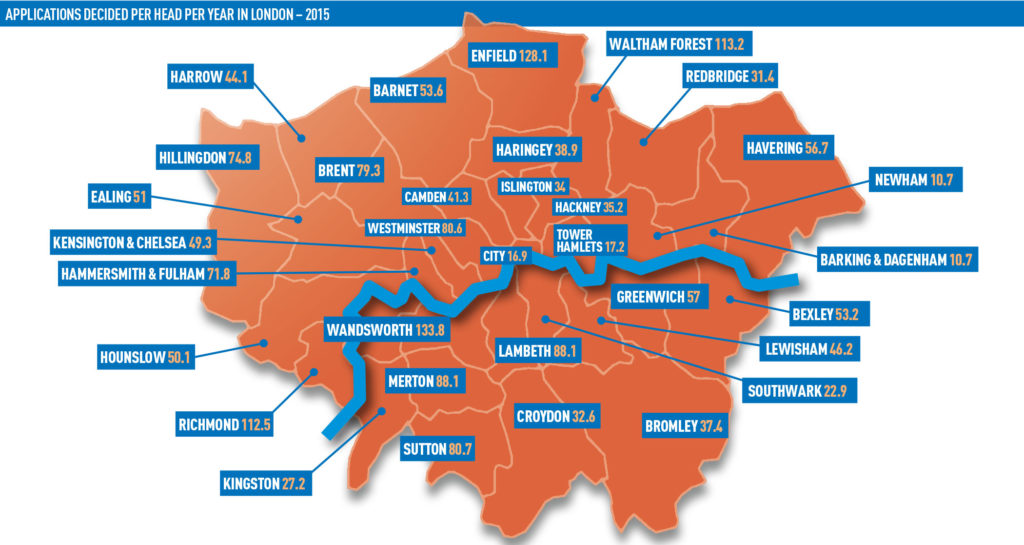Following EGi’s investigation into the planning system, Louisa Clarence-Smith takes a closer look inside the nation’s local authorities

Complaining about planning is a favourite British pastime. While our planning system is the envy of many nations, we love nothing more than to document how it is broken.
A British Property Federation and GL Hearn survey this month found that the property industry was more dissatisfied with the planning system than it has ever been, with 65% of planning officers and 36% of developers concerned it is getting worse.
Planning wasn’t always so political. “The public are very interested in the planning system, anything that might affect their houses, much more so than they would have been 40 or 50 years ago,” says Westminster City Council’s head of planning John Walker. “I think if the government went back to the ’70s and looked at what planning reports looked like compared to what they look like today, it would see they are a lot more complex.”
Complex, yes. And, as a result, our planning system has become overstretched. An investigation by Estates Gazette found an 8.5% cut in staffing of planning departments between 2005 and 2015.
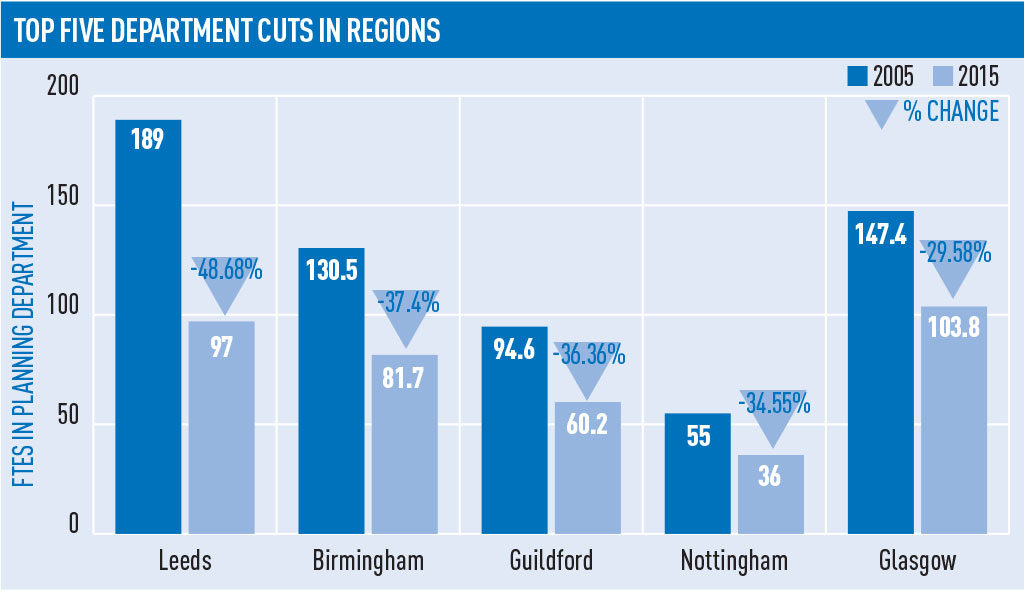
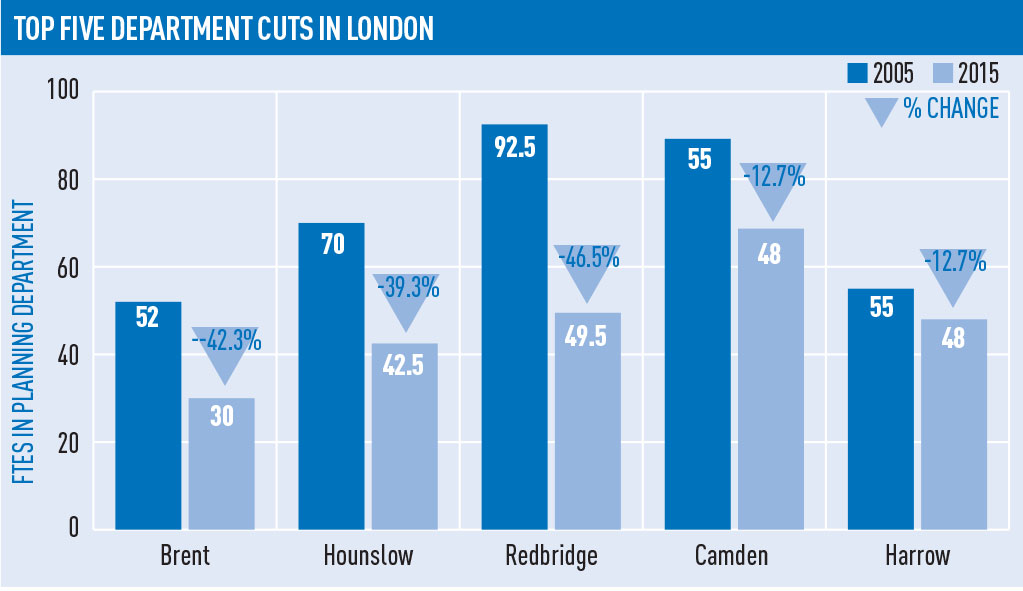
In 78.9% of cases where resourcing was reduced, planning departments also saw a reduction in the number of applications decided relative to applications submitted. This means developers face a postcode lottery with applications decided per head, ranging from 66.7 per staff member in Cardiff to 21.8 per staff member in Sheffield and Norwich.
With an increasing range of policy objectives to deliver, from Local Plans to sustainable drainage, a skills and resource shortage and a growing public awareness and interest in development, it is perhaps no surprise that local authority planning departments have been getting a bad name.
So what is the solution?
Time for a fee hike?
A common complaint made by planning authorities is that planning fees do not cover the cost of processing an application.
Birmingham City Council’s strategic director, economy, Waheed Nazir, says fees for major applications are sufficient, but for minor applications like household extensions should be set locally by planning authorities.
Under the current system, a house extension in Redcar, North Yorkshire, is subject to the same planning fee as a house extension in the West End of London, despite the fact that a Mayfair housing extension is likely to be subject to far more complex planning considerations.
Birmingham’s planning authority, which has seen a 40% reduction in headcount since 2010, has to be supported by money previously allocated to other departments.
“Planning is subsidised because the planning fee does not fund the resource required,” says Nazir. “And, you know, you’ll get others in the market saying that’s because they’re not efficient. I can tell you, I’ve taken 40% flat out of the organisation, it doesn’t get any more efficient.”
Government appears to be finally listening. Housing and planning minister Gavin Barwell has strongly hinted that the government will raise planning fees as part of a policy overhaul in the housing white paper due to be released this autumn.
He said: “I don’t think we are going to move to a model where we just let councils charge whatever they wish to charge. But we are sympathetic that there is a problem.”
A fee increase would be linked to performance with funds ring-fenced to planning departments. “I would want an assurance from the councils concerned that every single penny that they raised from the extra fees would be spent on additional spending in planning departments,” Barwell added.
Some of the more innovative planning authorities have been making use of powers to increase fees in other areas of the system, including planning performance agreements, pre-application advice and charges for invalid planning applications.
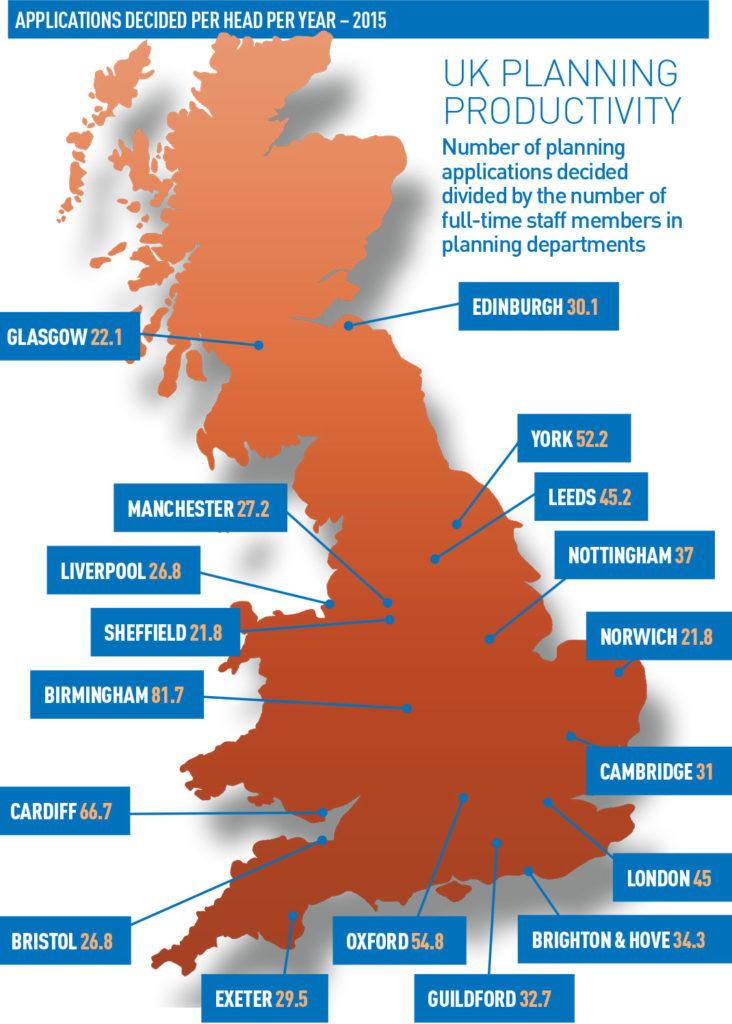
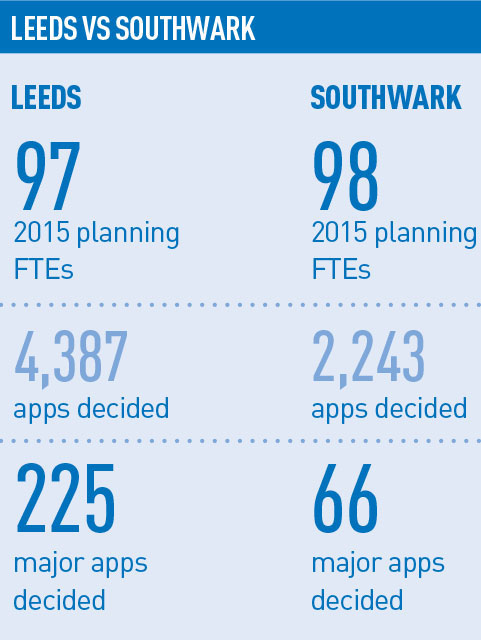 Westminster City Council has also introduced planning resource agreements, where developers which regularly submit minor applications can fund a full-time planner at around £50,000 per year for a minimum of two years.
Westminster City Council has also introduced planning resource agreements, where developers which regularly submit minor applications can fund a full-time planner at around £50,000 per year for a minimum of two years.
But the industry is in agreement that these measures do not go far enough. Philip Barnes, group land and planning director at Barratt Developments, says: “The new national policy in 2012 has worked well in encouraging more planning applications and producing more consents. However, it often proved difficult to quickly turn more consents into more new homes due to delays in getting pre-commencement conditions discharged and s106 agreements signed, even after the application has been determined.”
Jon Stoddart, senior director in the CBRE planning team, thinks that as well as PPA agreements, revenue from the New Homes Bonus should be reinvested in planning teams. “It seems only reasonable when much of the work to secure that avenue of funding is undertaken by the local authority planners.”
Alternative providers
A small amendment in the Housing and Planning Act could have big implications for the planning system.
The act legislated for a pilot where planning applications are processed by an “alternative provider”, which could be a private company or another local authority.
Westminster’s Walker thinks it would be disastrous. “Planning is a very emotive area because when a decision is made, particularly in towns and cities, there’s always going to be objections from the public and it’s absolutely vital that planning is seen to be even-handed in the way it deals with all parties,” he says.
“If I was a developer and I had to make a decision and was looking to process a planning application the first thing I would do is look at all of them and see which one makes more recommendations for getting permissions. Whether the public authority listens or not, the public perception is that the decision is not independent.”
Another interpretation of the measure is that more efficient planning departments take on some of the workload of less well-resourced boroughs.

CBRE’s Stoddart says: “While this option does have merit, we would be concerned that the area of development focus is significantly widened and that local expertise and experience of planning officers in an area is lost.”
But with the Greater London Authority looking at creating its own planning taskforce to swoop in and assist struggling local authority planning departments, the trend for delocalised planners is likely to be on the up.
Cambridge City Council and South Cambridgeshire District Council are in the process of creating a shared “Greater Cambridge” planning service to plan and effectively manage the significant growth envisaged in the two local plans for the area (some 33,500 homes and 44,000 new jobs).
Stephen Kelly, joint director of planning and development at Cambridge City Council and South Cambridgeshire District Council, is a strong advocate of merged planning departments.
“This should improve resilience and help in managing the significant requirements from the development industry for engagement and progression of major projects – alongside the production of a single development plan for the area and more straightforward ‘development management’ activity,” he says.
The change in departmental structure is also a response to the growing demands of the Cambridge knowledge corridor, a science and innovation cluster heading out of the city towards Stansted Airport.
Skills shortage
With staffing such a huge issue for planning departments, how can local authorities ensure they have the skills they need?
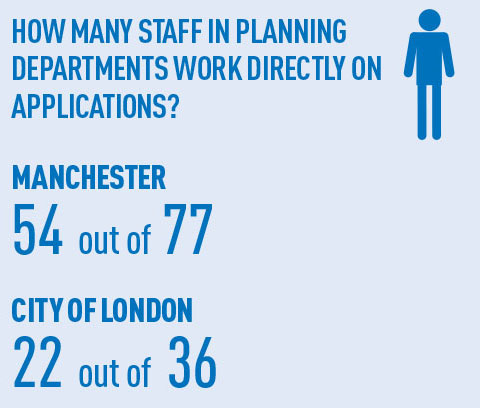 Turnover of staff is notoriously high, as planners take the skills they have learned to the higher-paying private sector.
Turnover of staff is notoriously high, as planners take the skills they have learned to the higher-paying private sector.
Pat Hayes, Ealing’s executive director of regeneration and housing, says freeing up planners from mundane domestic applications through deemed consents for certain building types in defined areas would help save money and retain skilled staff.
He thinks there are plenty of skilled graduates coming out of the university system, but that they often arrive and become disenchanted with all of the mundane projects.
In Birmingham, there is now an established graduate programme to secure planners from local universities. Nazir says many do leave after the two-year scheme to join the private sector, but he says even if he only keeps half that is still a success and at least those leaving do so with a good knowledge of how the public sector planning departments operate.
Walker says we need to ensure the right message about planning gets out. He says: “I think that we should be promoting planning as a great profession and it’s becoming more and more important as towns and cities get more and more crowded and you have different types of uses and activities that want to coexist it’s very important for planners to get it right and make sure those things work together.”
He adds, “It’s ultimately down to them [politicians] to stop putting planning down which is putting people off.”
And he has a radical idea – for ministers to stop adding new bits of policy to the planning basket, and start taking things out. “Whenever they introduce something which is meant to simplify things, we get developers calling up because they don’t understand what it is,” he says. “What the government should be saying is, can we take things out of the basket?”
A spokesman for the Royal Town Planning Institute warned that simplifying the system should not be at the expense of quality. “Simplifying and speeding up the planning process is necessary in some areas, but we must not sacrifice quality for speed,” he said. “We need a system that helps planners bring about sustainable places that benefit communities, the economy and the environment in a balanced way, and not constant changes that simply allow developments to take place more easily.”
Perhaps the real policy solution is no more new policy at all. Stripping the system back down would free up planners and make things clearer and more simple for all parties.
• To send feedback, e-mail Louisa.Clarence-Smith@estatesgazette.com or tweet @LouisaClarence or @estatesgazette








